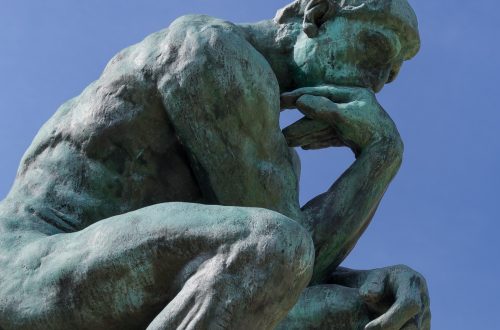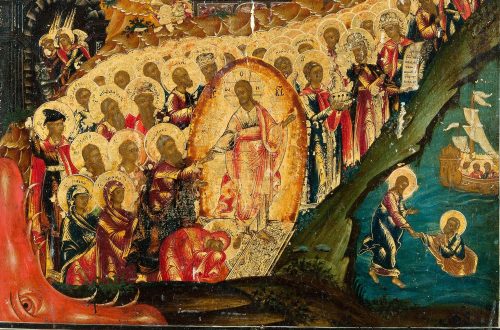by Matthew Axvig
This year Lent has caught me off guard, out of step with my church calendar because of the pandemic. I trust I am not alone. So one of my resolutions has been to get back to going to church and to practice the disciplines of the faith alongside fellow Christians. It has been a hard winter in lots of ways, and my spiritual life is not immune to the toll the virus took. That said, one upside of the interruption is that I have made an unlikely substitution for what would have been conventional devotional reading in a more typical year: Shakespeare’s Hamlet.
Beyond the memento mori in such iconic scenes as Hamlet with a skull that now screams “Ash Wednesday” to me, there is throughout the play a sustained examination of sin and death as well as a subtle diagnosis of an insidious idolatry of reason. Near the end of the play, Hamlet asks himself:
What is a man,
Hamlet IV.iv
If his chief good and market of his time
Be but to sleep and feed? A beast, no more.
Sure he that made us with such large discourse,
Looking before and after, gave us not
That capability and godlike reason
To fust in us unused?
Hamlet here identifies his spiritual plight. On the one hand, he realizes that his task to outwit his uncle and avenge his father means he has a chance to fulfill his destiny as a man. For the human being is the animal that “with such large discourse, looking before and after” makes clever moves, on a chessboard as it were. To fail to rise to this moment, to figure out the situation, and to act decisively is to become “A beast, no more.” On the other hand, Hamlet implies that this “godlike reason” could lead him astray into idolatry. If Hamlet completes his mission and masters his enemy, does that make him properly like God, or does that improperly transgress upon God’s place? Perhaps this among other uncertainties is behind Hamlet’s procrastination. Hamlet is working through a tension between his prudential self-care and the providential care of God, between faith and reason. Hamlet is more than capable of winning the game. His concern is that he wants to play in a certain way.
The temptation of the rational creature to play God is both universally human and distinctively modern. Thomas Hobbes was among the first to weaponize reason in this way. He writes, “it is a precept, or general rule of reason that every man ought to endeavour peace, as far as he has hope of obtaining it; and when he cannot obtain it, that he may seek and use all helps and advantages of war.” A weaponized reason makes war the baseline and peace a strategic achievement of war. Peace is conceived primarily expediently. That is, as smart, safe, and advantageous; not so much as true, good, and beautiful. Moreover, self-interested actors make peace the exception rather than the rule in a dynamic competition for resources and for power and glory.
Hamlet also weaponizes reason, though in a different way, when he considers suicide. He says in effect that every man ought to preserve himself, as far as he can; and when he cannot, when things fall apart, he may resort to suicide. This is Hamlet’s version of Hobbes’ rule of reason. But Hamlet goes on to say that death might not provide the cessation he hopes for, if there is indeed an afterlife and a judgment.
In the famous “To be or not to be” speech in Act II, Hamlet wonders whether he must suffer his cruel lot indefinitely. Might it not be nobler to “take up arms against a sea of troubles” than to patiently bear them? — nobler, in that suicide would be a contrivance of reason that distinguishes man from beast. And if he plays the beast of burden and does nothing, he may be ignobly killed by his enemy or be shamefully betrayed years later by his own decrepit body. Granted, it is strange nonsense to think of suicide as self-protection, but on another level it is quite profound — a testament to man’s spiritual development beyond an animal state. Man is the animal that can dictate his own end, but that can also choose to suffer instead.
“To die, to sleep; / To sleep, perchance to dream.” For a moment, it seems to Hamlet that death promises peace after the storm, but then…
Ay, there’s the rub,
III.i
For in that sleep of death what dreams may come,
When we have shuffled off this mortal coil,
Must give us pause. There’s the respect
That makes calamity of so long life.
In other words, fear of the afterlife outweighs the suffering of this life and “makes cowards of us all.” Once Hamlet extends his gaze beyond the horizon of his own death, he places this new fear of the unknown in the balance, thus reversing the scales of judgment.
In the last act, Hamlet is invited to fence with Laertes, whom he has grievously wronged. The King and Queen, whom he fears as well, would be in attendance. He tells his friend Horatio that, having practiced more, the odds are in his favor. And it is just sport after all. He can lose without real danger. Yet he senses this may be a trap. He refers to his hesitancy as “augury” (his gut being the omen, and his voicing it the augur’s interpretation). When Horatio suggests in an abundance of caution that he bow out, Hamlet refuses:
Not a whit, we defy augury. there’s a special providence in the fall of a sparrow. If it be now, ‘tis not to come; if it be not to come, it will be now; if it be not now, yet it will come. The readiness is all. Since no man of aught he leaves knows, what is’t to leave betimes?
V.ii
“The readiness is all.”
How did Hamlet arrive at this surrender? Whereas before he wanted to manage his life and death, he is now content to let that be and to focus instead on being ready for whatever is in store. What a triumph of trust!
Shakespeare’s tragedy is worth reading and re-reading for an education of the moral imagination in navigating being a human. Somehow we have to figure out how to let God be God without shelving the reason he gave us to use for self-preservation. How can we be both wise and innocent, skeptical and trusting? On paper, it is a paradox, but in life, it seems, it is possible.
I think for me Hamlet’s youth is particularly helpful. In and after college, I took risks that defied calculation, risks like majoring in philosophy, getting married, serving abroad with the Peace Corps, and a little later on, having children. But as I get older, I find myself settling in. And with that I find myself asking questions like, “Am I supposed to be planning for retirement? What about college funds? How does my status compare with others’?” Reading Hamlet, I am reminded that I do not want to live like a responsible adult — at least not as defined by my materialistic mileu.
Rather, I want to live like the saxifrage, in William Carlos Williams’ “A Sort of Song.” We tend to harden, to calcify, to become all-too-reasonable as we get older. But that is to become less human, less in relationship to a God who moves mountains. So, from time to time I need a flower that breaks rocks. And this year, Hamlet is that flower.
Hamlet’s friendship with Horatio in particular has broken through and brought into sharp relief how things stand with me and my friendships. Needless to say, middle-aged men are not good at making and sustaining meaningful ones. Typically, the demands of work and family take over after college leaving little time for friendship, and the third spaces outside of the office and the home, the public spaces where the activity of friendship can happen, are harder to come by as well. So often I settle for what Aristotle would call a friendship of convenience and utility. And these are more reasonable and less human than I would like. To avoid such a friendship with Horatio, Hamlet has to be intentional. He has to disabuse Horatio of the notion that he would flatter him, since flattery, too, is an arming of reason and a way to play the game. So after decrying flattery, Hamlet speaks his heart to Horatio and declares his genuine friendship:
Nay, do not think I flatter;
III.ii
For what advancement may I hope from thee,
That no revenue hast but thy good spirits
To feed and clothe thee? Why should the poor be flatter’d?
No; let the candied tongue lick absurd pomp,
And crook the pregnant hinges of the knee
Where thrift may follow fawning. Dost thou hear?
Since my dear soul was mistress of her choice
And could of men distinguish, her election
Hath seal’d thee for herself; for thou hast been
As one, in suffering all, that suffers nothing,
A man that fortune’s buffets and rewards
Hast ta’en with equal thanks; and bless’d are those
Whose blood and judgment are so well co-mingled
That they are not a pipe for fortune’s finger
To sound what stop she please. Give me that man
That is not passion’s slave, and I will wear him
In my heart’s core, ay, in my heart of heart,
As I do thee.
Note the Lenten motifs here. Apparently, Horatio, like the Apostle Paul, has learned the secret of contentment. He is content, whether in riches or poverty, good or bad fortune. So flattery has no purchase here. He is content with what he has, and his friendship is a gift. Relatedly, Horatio “is not passion’s slave.” He has self-control.
What I have found most compelling this Lent, however, is not so much the virtues themselves, but their being directed to the end goal of a deep friendship. The discipline of self-control is important, not in itself, nor because it makes oneself a more formidable opponent in the game of life, but because it allows one to give oneself wholly and faithfully to the beloved. In other words, it is the Lenten virtues of abstinence that make Horatio a better friend than Rosencrantz and Guildenstern. Hamlet knows, for example, that he can trust Horatio to “absent thee from felicity awhile” in order to do the works of love, whatever those may be. So the beatitude from Hamlet I will take with me from this Lent is once again, “bless’d are those whose blood and judgment are so well commingled that they are not a pipe for fortune’s finger to sound what stop she please.” And I want to pray it without guile, unguarded, open to the foolishness of friendship.

Matt Axvig is a teacher from Minneapolis, MN and father of two boys and two girls. He enjoys driving (sometimes aimlessly) and listening to music. He loves playing tennis and wakes up in the middle of the night to watch the Australian Open every January. He dreads Roger Federer’s retirement. And midway through his life’s journey, he takes satisfaction in having made several leaps of faith – going away to college in Chicago, majoring in philosophy, getting married and having children, living abroad in Peace Corps Moldova, quitting jobs with nothing lined up, switching careers, and joining the Eastern Church.
Header Image: ‘Saxifraga paniculata,’ Arctic-Alpine Botanic Garden, Tromsø, Norway (Diego Delso, 2019 (cropped and edited) by license CC-BY-SA.





